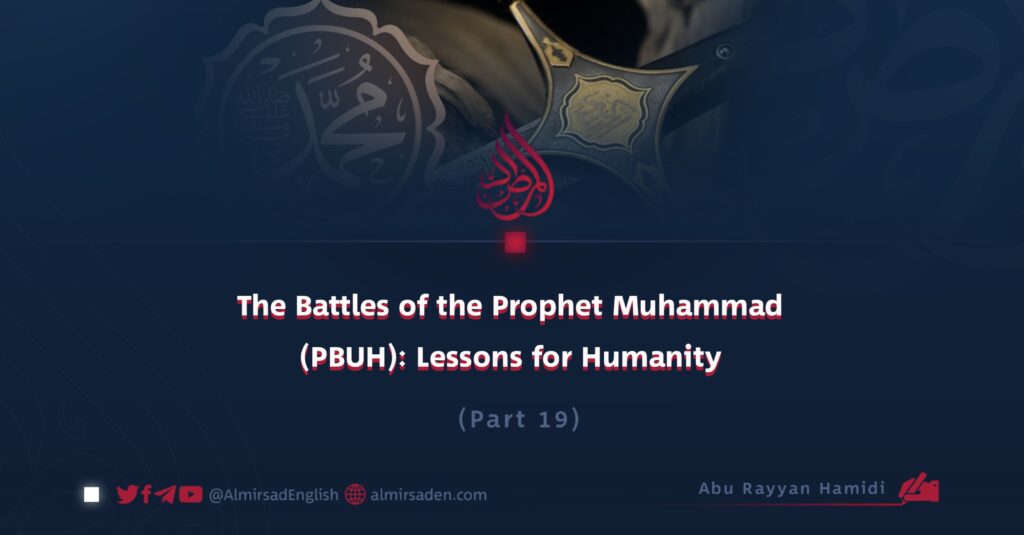Part 19
By Abu Rayyan Hamidi
As we continue to reflect on the Battle of Badr, a number of further lessons and insights come to light.
16. Seeking Assistance from Non-Muslims
When the ranks were being arranged for the Battle of Badr, a polytheist attempted to join the Muslim army. The Prophet (PBUH) ordered him to step aside. Later, however, that man embraced Islam and was allowed to rejoin.
This incident demonstrates an important principle: a Muslim ruler may, under certain circumstances, seek the assistance of non-Muslims in public affairs. Such cooperation is permitted only when specific conditions are fulfilled:
1. The arrangement must serve the interests of Muslims.
2. Assistance must not relate to matters of da’wah.
3. Trust and reliability must be assured.
4. The non-Muslim must remain subordinate to Islamic authority.
5. He may not assume command or leadership over Muslims.
6. His involvement must not create confusion or doubts among the believers.
7. There must be a clear and pressing need for such assistance.
With this in mind, it becomes clear why the Prophet (PBUH) did not accept the polytheist’s presence at Badr. The final condition was absent: there was no pressing need. Yet during the Hijrah, when the Prophet (PBUH) and Abu Bakr (RA) employed the guidance of the polytheist ‘Abdullah ibn Uraiqit, all of the conditions were fulfilled, and the situation demanded it.
17. The Prophet’s Shelter Beside the Battlefield
Before the clash at Badr, a modest shelter was built for the Prophet (PBUH). From this simple act, profound lessons can be drawn for leadership and strategy.
A commander should position himself where he can oversee the army’s movements and direct the course of battle. Equally, his protection must be a priority, for the fall of a leader can break the morale of his soldiers. For this reason, the Prophet (PBUH) was guarded by a dedicated unit under Sa’d ibn Mu’adh (RA).
On the night before the confrontation, something remarkable occurred: the Muslim army slept in deep peace, despite the enemy being so near. Scholars of Seerah explain this in two ways. On one hand, exhaustion from the journey made rest a necessity, and Allah granted them sleep so their strength would be renewed. On the other, fear is natural in the shadow of an enemy, but Allah removed it from their hearts and replaced it with serenity.
Chapter Two: From Engagement to Victory
1. The Prophet’s Battle Formation
The formation arranged by the Prophet (PBUH) at Badr was unlike anything familiar in Arabian tribal warfare. He placed his companions in rows resembling those of prayer. Spearmen held the front line to counter cavalry, while archers formed the second.
This disciplined order impressed and unsettled the Quraysh. To them, the Muslims appeared as a single, unshakable force. The Prophet (PBUH) also kept a small reserve at his side. With it he could reinforce weak points or launch sudden strikes, tactics that repeatedly surprised the enemy and undermined their resolve.
The lines stood like a wall, firm and unbroken. Before the battle began, the Prophet (PBUH) gave his companions careful instructions: wait until the enemy draws near, strike with the sword only once they enter your ranks, and conserve your arrows until they can be used with precision.
These were not the calculations of a seasoned general but the guidance of a Prophet whom Allah had endowed with wisdom beyond human training. Through such divinely inspired strategy, victory was secured.
2. The Incident of Suwad ibn Ghaziyyah
As the Prophet (PBUH) was straightening the ranks with his spear, he nudged Sawad ibn Ghaziyah (RA). Suwad objected, saying, “Messenger of Allah, you have hurt me, and I want to take my right.” The Prophet (PBUH) permitted him to do so. Instead of striking, Suwad embraced him and kissed his blessed body.
From this story several lessons can be drawn. First, discipline and order are a long-standing part of Islamic tradition, and they remain essential for success in every field. Second, Islam is a religion of justice: there is no difference in rights between noblemen and common men. Third, soldiers should be bound to their leader not only by command but also by love and devotion. For the companions, to touch or kiss the Prophet (PBUH) was an honor beyond measure. Finally, the Prophet’s action also showed that the part of the body above the navel is not considered ‘awrah. If it had been, he would not have allowed Suwad to touch his stomach.
